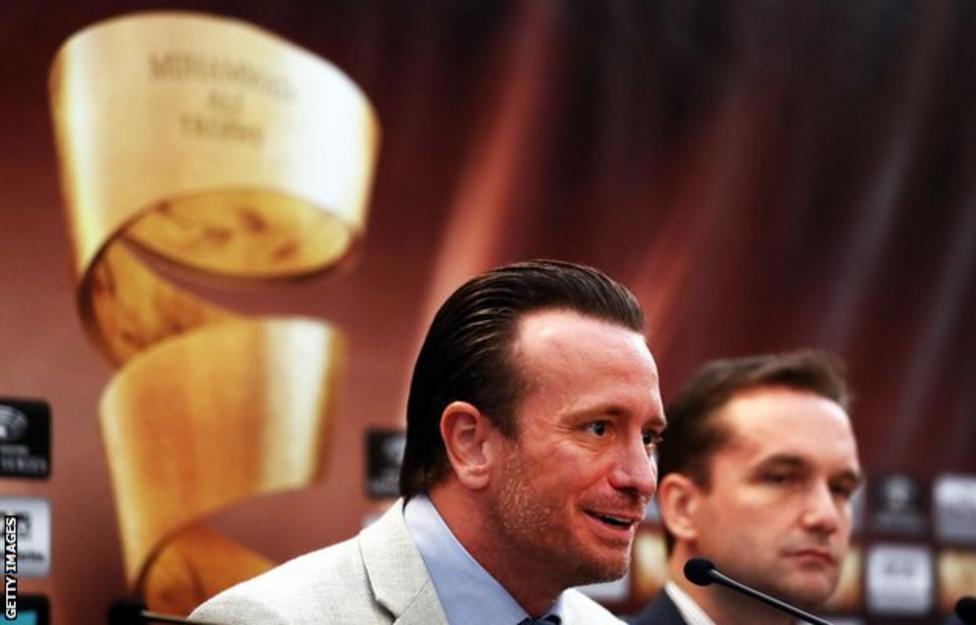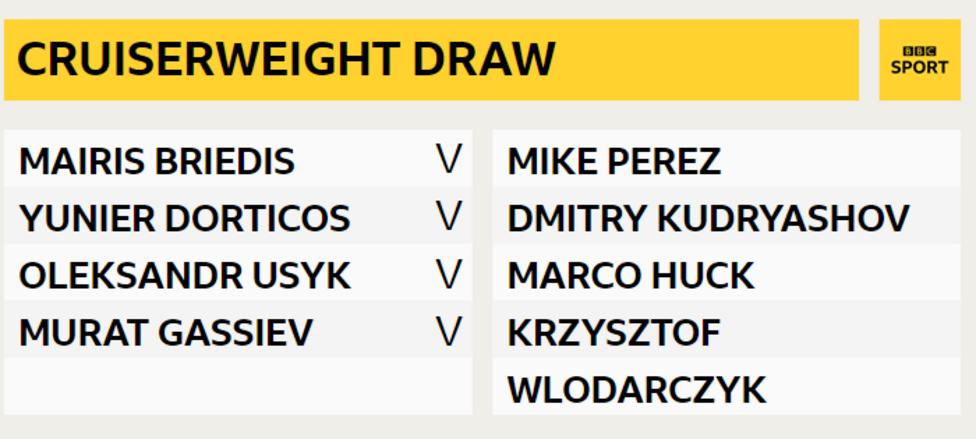 Re: Live on ITV!!! World Super Series - Eubank Jr/Groves/C.Smith/Usyk/Briedis/Gassiev
Re: Live on ITV!!! World Super Series - Eubank Jr/Groves/C.Smith/Usyk/Briedis/Gassiev
It is fair to say fighters have been positive about the concept. IBF super-middleweight champion James DeGale desperately wanted to enter were it not for a shoulder injury.
But four British names already feature in the super-middleweight branch of the tournament, headed by WBA champion Groves.
He faces fellow Briton Jamie Cox in London on 14 October, with the winner meeting the victor of Eubank Jr's fixture with Avni Yildirim in Germany a week earlier.
Many in the sport were shocked Eubank picked the undefeated and tricky Turkish fighter but should he beat him and face Groves, fans could see an all-British semi-final with the WBA title on the line.
Liverpool's unbeaten Callum Smith is seeking his own first world title shot and makes up the British contingent, getting his tournament underway against Sweden's Erik Skoglund - who sports a perfect 26-fight record - in his home city on 16 September.
Groves is the only world champion in the super-middleweight tournament but in the 200lbs cruiserweight division, three titles should in theory be unified by May.
Latvia's Mairis Briedis (WBC), Russia's Murat Gassiev (IBF) and Ukraine's Usyk (WBO) will all put their titles on the line, meaning the tournament winner will sweep the belts.

The Muhammad Ali Trophy the two winners will receive was designed by the late Silvio Gazzaniga, who created and designed the Fifa World Cup trophy in 1971.
The two tournaments will boast a $25m prize fund, with the winner of each expected to rake in a haul of $10m in total across the three victories required to land the title.
Boxing does not have the choice of using a penalty shootout to decide any tournament match which ends in a draw on the scorecards, so a quirk in scoring the bouts has been introduced.
Any fight deadlocked on all three cards will see a fourth ringside judge called upon. If their card is also level, the winner of the final round of the bout progresses.
Sauerland stresses keenly that on boxing records, such a bout would still be marked as a draw. The tie-break protocol is only used to decide who progresses, not necessarily who wins.

A tournament featuring super-middleweights named the Super Six World Boxing Classic took place between 2009 and 2011. While its cast was stellar, with victory being claimed by Andre Ward, its length meant the event's momentum arguably waned.
Other incarnations of tournament formats such as the Prizefighter Series enjoyed success, with shorter fights ensuring an event could be concluded on one night.
The new competition has interested Television bosses, with rights sold across Europe. A US deal is "in the pipeline", according to Sauerland, who last week announced ITV will broadcast the tournament across its platforms in the UK.
"I think it was one of the biggest deals in British boxing history in terms of scope," he added. "Make no mistake about it, the UK market is now the most important in the world."
Some of the fights will be free to air, while others will be pay-per-view. Unlike some traditional fight deals cut in the UK, fighters will not receive bonuses for pay-per-view sales and will be rewarded through already agreed appearance fees and prize money.
"We have invested a lot of money to try and not be too like boxing," added Sauerland. "If you look at Wimbledon, would Roger Federer get a bonus because Swiss TV paid extra? He'd get prize money, like fighters will here."
Those backing the Super Series hope to roll the tournament out across more weight divisions with time. Saturday night, when Huck meets Usyk in Berlin, could be a first step in returning professional tournament boxing as a mainstay.
http://www.bbc.co.uk/sport/boxing/41195151
Do not let success go to your head and do not let failure get to your heart.


 Thanks:
Thanks:  Likes:
Likes:  Dislikes:
Dislikes: 






 Reply With Quote
Reply With Quote
Bookmarks